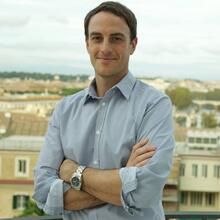If you had three minutes to give an intervention inside the Synod on Synodality, what would you say? Would you declare that something is wrong in the church and call on the synod to change it? Would you express your fear or hesitancy that the synod might change something that is “unchangeable”? Would you say something about your local parish or community that, though meaningful, isn’t as relevant to advancing the discussion on synodality? I would tell a story.
Two young Filipinos stepped up to a microphone in front of 30,000 other youth and an old man dressed in white. Jun, age 14, and Glyzelle, age 12, both formerly homeless, unfolded a piece of paper and began telling their life stories to Pope Francis. They must have been nervous, but it didn’t show. In their short lives, they had seen and experienced much more traumatic and nerve-racking things.
Jun began living on the streets of Manila when his family couldn’t afford to send him to school. He searched for cardboard to sleep on and ate what he could find in the garbage. On the streets, kids lose any respect they had for adults, he said. They are taught to steal, kill if necessary, and some of them start using drugs.
Glyzelle confirmed the problem of drug use among street kids and added that many are completely neglected by their parents. They become easy prey for human traffickers and are forced into prostitution. Then, bursting into tears, she asked a question: “Why is God allowing this to happen to us, even if it is not our fault?”
This synod, more than any other, is built on the premise that realities are greater than ideas.
As they put aside their text and walked toward the pope, Francis met them and embraced them. Now it was his turn to speak. Putting aside his prepared address, the pope said: “This girl has asked the one question that doesn’t have an answer. And she couldn’t say it in words. She had to say it with tears.”
It was a question with no easy answer. In an era when we often feel compelled to offer our own definitive answers, the pope admitted he didn’t have one. “Only when our hearts can ask this question and weep, can we begin to understand,” he said. “Dear young men and women, our world today needs weeping. The marginalized weep, those who are neglected weep, the scorned weep, but those of us who have relatively comfortable lives, we don’t know how to weep. Certain realities of life are seen only with eyes that are cleansed by tears.”
I’ll never forget this powerful insight offered by Pope Francis in Manila in January 2015. What is real and true can be known through eyes that have been cleansed by tears. We can all attest to the experience of crying and wiping away tears. It often happens when we realize we’re not in control and we’re facing an unanswerable question. At that moment our sight is blurry, but crying opens in us space for profound empathy and compassion, which can ultimately change the way we see things. Tears flow when sincere listening takes place, without judgment or the compulsion to immediately rebut or respond.
There are many different kinds of interventions being made inside the synod hall this month. Undoubtedly, some members are sharing powerful stories of deep hurt, persecution and exclusion, and also of resilience and hope. Many of the questions being discussed at the small tables do not have easy answers. How will the synod respond?
At the conclusion of his conversation with the young people gathered in Manila, Pope Francis said: “Pardon me that I read practically nothing of what I had prepared. But there is a phrase which gives me a little bit of consolation: ‘Realities are greater than ideas.’ And the reality [which the young people who spoke] described, your reality, is greater than the ideas which I had prepared.”
Realities are greater than ideas. It’s a framework for Francis’ papacy through which we see his proclivity for pastoral nuance. It’s why he responded as he did to five cardinals who, prior to the synod, raised doctrinal questions about the authority of the synod, women’s ordination and blessing homosexual unions. The pope reiterated established church teaching but added: “In dealing with people, however, we must not lose the pastoral charity that must permeate all our decisions and attitudes. The defense of objective truth is not the only expression of this charity, which is also made up of kindness, patience, understanding, tenderness, and encouragement. Therefore, we cannot become judges who only deny, reject, exclude.”
The press has been given very little information about what’s happening inside the synod hall, but the synod’s communications team has confirmed that difficult conversations—for which there are not easy answers—are happening. The methodology is structured to facilitate deep listening and discernment. This synod, more than any other, is built on the premise that realities are greater than ideas. To what extent stories are shared and tears are shed, we don’t yet know. But it seems to me that those powerful interventions could have the greatest potential impact on the unfolding communal discernment.







